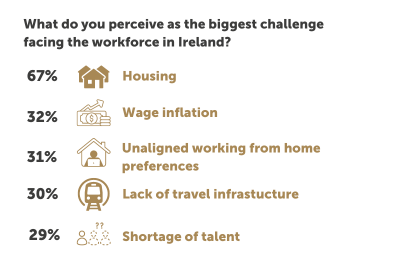Key changes to Ireland’s employment permits, and what it means for employers
A shortage of talent can contribute to higher inflation, lower economic growth and limitations in public finances. But now the Irish government is looking to tackle this issue head-on by redefining its labour market with the introduction of more flexible work permit regulations, effective from the 2nd of September.
Key changes for employment permit holders
The new Employment Permits Act
2024 has been put in place for individuals originating from outside the
European Economic Area (EEA). The goal is to make it less complicated for these
individuals to gain employment and reside in Ireland. This new legislation is a
testament to the government's commitment to making the permit system more
adaptable, which will enable it to react to changes in the labour market more
quickly.
- Enhanced worker mobility: One of the key updates in this policy is the allowance for some employment permit holders to switch employers after just nine months. This move is expected to significantly enhance worker mobility. Additionally, the introduction of a seasonal employment permit is designed to accommodate the unique needs of certain industries, such as fruit picking, that heavily depend on seasonal labour.
- Greater safeguarding of employee rights: Ireland's minister for enterprise, trade, and employment, Peter Burke, highlighted that the updates to the Employment Permits Acts will not only create a more adaptable system but also ensure that the rights of the employees are safeguarded.
- Contractors can now access the permits: The new regulations have also introduced an opportunity for subcontractors to gain access to the employment permit system. This is a significant step towards broadening opportunities for foreign workers across various industries. However, with new rules come new responsibilities. Employers will now be required to meet additional requirements, such as making provisions for training and accommodation support for permit holders.
- Employment agencies can obtain permits for their contractors: Previously, employment agencies were strictly prohibited from being able to obtain employment permits for their agency workers. The new system will now allow for employment permits to be issued in situations where an entity other that the employer is paying the salary of an employment permit holder. This allows employment agencies to be listed as the employer of the employment permit holder, even when the individual will be conducting work for a client of that employment agency and potentially be paid by that client.
Is this the solution to the challenges facing the Irish labour market?
As part of our most recent Market
Insight & Salary Trend Report, we asked our Irish community “what do you
perceive as the biggest challenge facing the workforce in Ireland?” But only 29% of people perceived shortage of
labour as the most pressing issue. Lack of housing and unaligned working from
home preferences are amongst the issues affecting businesses.

With that being said, housing supply is slowly increasing, with 33,000 new houses being built in 2023 – nearly double the 2017 total.
Furthermore, the push and pull between employees wanting hybrid and remote working opportunities is not unique to Ireland. In fact, 98% of businesses are encouraging employees to return to the office and only 27% of employers have more than half of their workforce hybrid working.
However, businesses where hybrid and remote working is an option, will always receive interest in their roles. Therefore, where businesses are able to offer these options, they are in an excellent opportunity to engage top level candidates.
How can employers take advantage of this opportunity?
There are two key opportunities available as a result of these work permit changes.
Opportunity 1: employers now have a much wider talent pool available to them for interim and temporary assignments. To survive and thrive during uncertain times, your business must be agile and flexible and engaging contractors to work on specific projects or to fill talent gaps is a fantastic way of achieving this.
Opportunity 2: as a result
of simplifying the permit system, businesses can access a wider range of out of
country talent. This is a significant step in addressing labour market needs
and retaining existing talent as these changes are anticipated to simplify the
permit process for both foreign workers and employers.
Find your next hire with Marks Sattin Ireland
Marks Sattin Ireland is uniquely placed to help businesses looking for hard to reach talent. We have extensive in-country networks, and corporate backing from a Top 20 global recruitment and HR services organisation. We specialise in a variety of markets, including financial services, professional services, executive search and commerce and industry. If you would like to learn more about how Marks Sattin can help with your recruitment needs, contact our team today. Alternatively, explore our latest jobs or keep reading our content for more interesting news and insights.



